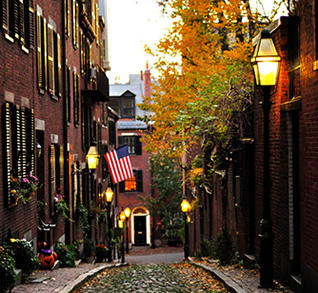
Courtesy of Michael Krigsman Flickr's Creative Commons
At the end of the American Revolution, Massachusetts had more free black people than slaves, and by 1783, Massachusetts had abolished slavery. The first Federal census in 1790, recorded Massachusetts as the only State in the Union that had no slaves. Between 1800 and 1900, most of the free African Americans in Boston lived in an area now called the North Slope of Beacon Hill, a hilly neighborhood with winding streets and narrow pedestrian alleyways. The people there actively participated in the Underground Railroad and worked to better the rights of all African Americans. Boston African American National Historic Site preserves many of the buildings and a memorial associated with this thriving community. Fourteen sites linked by the 1.6-mile Black Heritage Trail tell the story of the struggle, perseverance, and commitment of this African American community to black equality.
African Americans in the Beacon Hill neighborhood worked to find decent housing, educate their children, establish independent supportive institutions, and abolish slavery in the rest of the nation. Beacon Hill's historic buildings are its homes, businesses, schools, and churches. The community was a safe haven for many runaway slaves and became an important stop on the Underground Railroad.
The easiest way to see and experience Beacon Hill is to follow the Black Heritage Trail, which starts on the Boston Common at the Robert Gould Shaw/54th Massachusetts Regiment Memorial. Sculpted by Augustus Saint-Gaudens, this memorial is dedicated to the 54th Regiment of Massachusetts Volunteer Infantry. During the Civil War, the 54th Regiment was the first all black regiment recruited in the North. The next stop on the trail is the George Middleton House. Constructed in 1787, this is the oldest African American built house in Beacon Hill. The original owners were George Middleton, an African American veteran of the American Revolution, and Louis Glapion, an African American hairdresser. Both men were members of the African Lodge of Masons, which black educator Prince Hall established.
Other stops along the trail include the Phillips School, the John J. Smith House, and the Charles Street Meeting House. In 1855, the Phillips School became one of Boston’s first integrated schools. Before 1855, African American children in Beacon Hill attended school on the first floor of the African Meeting House and by 1834, at the Abiel Smith School. The Charles Street Meeting House was a segregated church at the time. In the mid 1830s, white abolitionist Timothy Gilbert challenged this segregation by invited African American friends to share his pew. The church expelled Gilbert, who eventually helped establish the First Baptist Free Church, “the first integrated Church in America.” Abolitionists like John J. Smith, whose shop was a center of abolitionist activity and runaway slaves, and Timothy Gilbert influenced the lives of many African Americans.
The trail leads from the Charles Street Meeting House to the homes of other abolitionists. The Lewis and Harriet Hayden House was the residence of an escaped slave and his wife. Lewis Hayden and his wife Harriet Hayden became leaders in Boston’s abolitionist activities and even turned their home into an Underground Railroad station. Reputedly, the Haydens kept kegs of gunpowder under their front porch, and when visited by authorities looking to retrieve runaway slaves, would come to the door with lit candles, threatening to blow up their own home rather than surrender ex-slaves in their trust. Hayden served as a recruiting agent for the 54th Regiment.
The remaining stops along the trail, the John Coburn House, the Smith Court Residences, the Abiel Smith School, and the African Meeting House, tell more stories of Beacon Hill’s African American community. John Coburn was at different times in his life a clothing retailer, a gaming house owner, the treasurer of the New England Freedom Association, a member of the Boston Vigilance Committee, and a cofounder and captain of a black military company. The final two stops are the Abiel Smith School and the African Meeting House.
The Abiel Smith School was a public school for black children constructed in 1834 with money that a white philanthropist left to the city of Boston for the education of black children. The school was the first of its kind in the nation. Before the dedication of the school in 1835, African American children in the Beacon Hill neighborhood attended school on the first floor of the African Meeting House.
Beyond serving as a school, the African Meeting House was also the center of Boston’s 19th century African American social, educational, and political community. Constructed in 1806 with money raised by both whites and blacks, the African Meeting House is the oldest existing black church building in the entire United States. African Americans mostly built it. Many events associated with the Abolitionist Movement occurred there. William Lloyd Garrison established the New England Anti-Slavery Society here in 1832, Frederick Douglass gave his anti-slavery speech in the building in 1860, and the Meeting House was a recruiting station for the 54th Massachusetts Regiment.
Boston African American National Historic Site preserves and interprets the sites, stories, history, and struggles of the diverse, lively, politically active, and very important African American community on Beacon Hill. Stops on the Black Heritage Trail bring the neighborhood alive. Visitors should also be sure not to miss the Museum of African American History's exhibit galleries and the National Park Service visitor center in the Abiel Smith School. The visitor center offers maps and site brochures for those who would like to follow the trail on their own, or sign up for a ranger led tour.
Boston African American National Historic Site, a unit of the National Park System, is located at 46 Joy St., Boston, MA. This is the location of the Museum of African American History's Abiel Smith School, which contains the museum and the National Park Service visitor center. For more information, visit the National Park Service Boston African American National Historic Site website or call 617-742-5415.
Last updated: August 18, 2017
